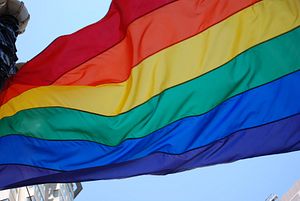A court ruling in January over workplace discrimination against a transgender woman drew attention this month in China. The court decided it was illegal for the e-commerce company Dangdang to fire the woman, surnamed Gao, for taking two month’s leave to undergo sex reassignment surgery. The court rules that Gao should be paid her overdue salary and retain her right to use the office’s women’s toilet.
Beijing, never much-lauded for complying with international human rights standards, currently faces mounting global pressure over the establishment of “vocational training centers” in Xinjiang, its handling of the Hong Kong protests, and the introduction of the controversial “national security law.” International views of China’s human rights conditions have plummeted to the lowest point since the Tiananmen protests.
Yet the development of LGBTQ rights in China, despite receiving meager media attention compared with other rights issues, may cast a different light on the perception of China’s poor human rights conditions. Homosexuality was decriminalized in 1997 and was officially removed from China’s list of mental illnesses in 2001. In 2008, the Beijing LGBTQ Center (Beijing Tongzhi Zhongxin), a nongovernmental organization, was founded to create an environment for “LGBTQ groups to live a life of equality, health, and dignity.” The Global Times interviewed the NGO’s director shortly after the center launched its official Douyin (China’s version of TikTok) account on July 12 of this year. In June, photos of a wedding ceremony between dancer Shui Yue and her girlfriend Pu Yurong trended on China’s Twitter-like Weibo. China has also accepted five of the U.N. Human Rights Council’s recommendations on LGBTQ+ rights in 2019.
These developments do not indicate that discrimination against the Chinese LGBTQ community is rare or nonexistent. Despite receiving 237,000 online suggestions and 5,600 letters advocating for same-sex marriage, Chinese lawmakers disappointed the LGBTQ community in June after China’s newly introduced civil code defined marriage as “a union between a man and a woman.” International rights groups such as Human Rights Watch (HRW) still consider China’s protection for LGBTQ rights to be insufficient, and scenes depicting homosexuality are censored in movies. Beyond the systematic disregard of their rights, LGBTQ individuals often become victims of domestic violence and face employment discrimination after coming out of the closet. Many suffer from mental health problems amid these social pressures.
However, to view China’s LGBTQ rights situation in absolute terms fails to capture the significance of Beijing’s relative tolerance for LGBTQ issues in a society with a large, conservative and rural population holding on to its “historical cultural value.” While social control has increasingly tightened under China’s current leadership, various LGBTQ organizations and activists managed to continue advocating for LGBTQ rights, while pro-democratic reform activists faced crackdowns over charges of “incitement to subvert state power.” Even the limited exposure that LGBTQ content receives is also significant given Beijing’s draconian control of information, which increasingly bans everything it deems unruly and inappropriate – from showing celebrities with tattoos and earrings to blood and corpses in video games.
The relative lack of restrictions on the LGBTQ rights movements in China may be due to the perception that the issue doesn’t pose a threat to China’s national security nor its political system, unlike the events in Xinjiang and Hong Kong. As a result, LGBTQ rights are not deemed important in the Chinese Communist Party’s policy agenda, and thus, there is a lack of guiding principles from the top leadership, which explains the contradiction in the different ways various government bodies manage LGBTQ related issues. The Guangzhou government had banned two LGBTQ rights organizations, for instance, while Global Times perceives interviews with the leaders of LGBTQ groups as permissible. The confusion about the official attitude toward LGBTQ issues could be observed when the Twitter account of the People’s Daily, the CCP’s official newspaper, celebrated Pride Month on June 7, but later deleted the tweet.
The looser restrictions on LGBTQ issues may also be due to the consideration of legitimacy, to show that the government is open to the concerns of the estimated 70 million LGBTQ people in China. In April 2018, Weibo retracted a decision to censor homosexuality-related contents after stirring up an online outcry. Amid the controversy, the People’s Daily itself appealed for anti-discrimination in an op-ed titled “‘Fireworks of different forms’ can also blossom” – a deliberate signal of the government stance on this issue.
Beijing’s relative tolerance for LGBTQ rights issues reveals a softer side of the Chinese government in managing human rights issues that don’t challenge its political authority. The implication is that China may allow certain aspects of human rights to thrive, given the right conditions. Doing so would significantly enhance China’s image in LGBTQ-friendly parts of the world and would alleviate criticisms of its human rights conditions by demonstrating a mixed approach toward safeguarding rights. By taking a proactive stance, China could demonstrate its system’s capability to push aside the conservative forces of society and transform the government into the protectorate of the largest LGBTQ community in the world. Doing so may lessen liberal democracies’ distrust of China’s political system and generate support from global LBGT rights networks. It may also make unification with the mainland a tiny bit less unappealing for politically active youth in Taiwan, which has legalized same-sex marriage.

































